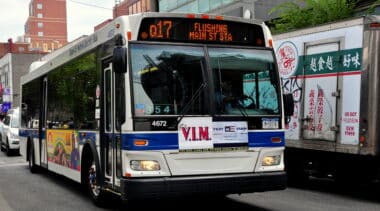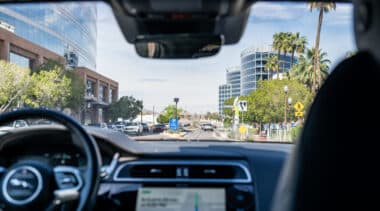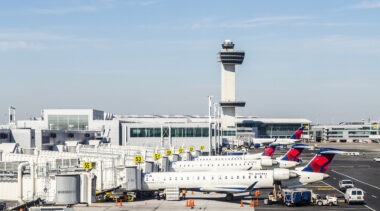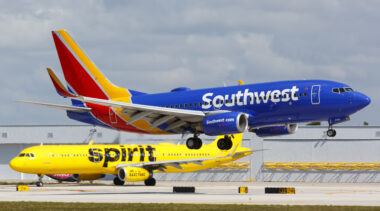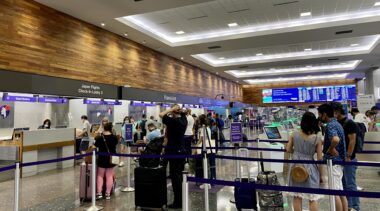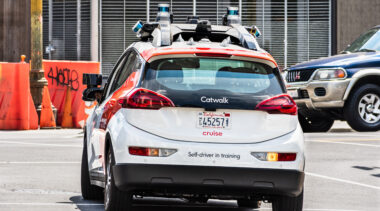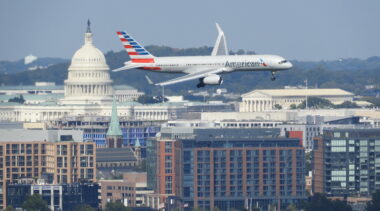Marc Scribner is a Senior Transportation Policy Analyst at Reason Foundation.
Scribner's work focuses on a variety of public policy issues related to transportation, land use, and urban growth, including infrastructure investment and operations, transportation safety and security, risk and regulation, privatization and public finance, urban redevelopment and property rights, and emerging transportation technologies such as automated road vehicles and unmanned aircraft systems. He frequently advises policymakers on these matters at the federal, state, and local levels.
Scribner has testified numerous times before Congress at the invitation of both Democrats and Republicans on issues including highway revenue collection, traffic congestion management, public transit productivity, freight rail regulation, airport financing, and air traffic control modernization. He is a member of the Transportation Research Board’s Standing Committee on Developments and Advancements in Transportation Technology Law.
He has appeared on television and radio programs in outlets such as Fox Business Network, National Public Radio, and the Canadian Broadcasting Corporation, and has also written for numerous publications, including USA Today, The Washington Post, Wired, CNN.com, MSNBC.com, Forbes, and National Review. And his work has been featured by The Wall Street Journal, New York Times, Washington Post, Los Angeles Times, Scientific American, Congressional Quarterly, Washington Monthly, POLITICO, CNN, Bloomberg, BBC, C-SPAN, and other print, television, and radio outlets.
Scribner joined Reason Foundation after more than a decade at the Competitive Enterprise Institute, where he was a senior fellow in transportation policy. He received his undergraduate degree in economics and philosophy from George Washington University.
-
Annual Aviation Infrastructure Report 2025
For the world overall, 45% of all passenger air traffic moves through airports with significant private investment.
-
Advancing remote air traffic control tower deployment in the United States
Remote/digital tower technology is in wide use in Europe and is rapidly expanding to Asia, Canada, and the Middle East.
-
The App Store Accountability Act would undermine privacy and parental choice
The App Store Accountability Act would make age restrictions online more invasive than in any other area of daily life.
-
Nevada Senate Bill 395 could hinder autonomous vehicle progress
Automated vehicle technology could greatly improve road safety and efficiency. Senate Bill 395 would move Nevada in the wrong direction.
-
Montana’s proposed regulatory framework for autonomous vehicles needs reform
Montana’s Senate Bill 67 attempts to provide a regulatory framework for autonomous vehicles, but the proposal conflicts with best practices learned in other states.
-
Addressing the transit productivity crisis
Public transit ridership is unlikely to recover to pre-pandemic levels within the next decade.
-
Delaware Senate Bill 46 would ban autonomous vehicles
Automated vehicle technology under development could greatly improve road safety and efficiency.
-
Tennessee Senate Bill 310 would prohibit driverless vehicles
Automated vehicle technology could greatly improve road safety and efficiency.
-
Recommendations for the FAA reauthorization bill
Congress should encourage the adoption of space-based ADS-B in air traffic control, the deployment of remote air traffic control towers, and more.
-
Airline deregulation: Past experience and future reforms
The U.S. experience with airline deregulation shows that eliminating government barriers to competition can generate enormous benefits for consumers.
-
Preserving and expanding the benefits of airline deregulation
Three reforms Congress could make to expand the benefits of airline deregulation.
-
Automated vehicle policy recommendations for the 118th Congress
The future of automated driving systems and how to refocus federal policymaking on productive near-term activities.
-
Protecting customer privacy in mileage-based user fee collection
Policymakers and the public have expressed concerns about road user privacy in mileage fee systems, especially those that involve a location-based component.
-
Freight rail deregulation: Past experience and future reforms
Advancing the public interest demands that regulators consider the unique characteristics of the industry in question and its role in the broader economy over the long-run.
-
Modernizing the passenger facility charge to improve aviation
Modernizing the passenger facility charge would improve airports and increase airline competition.
-
The benefits of the pupil transportation policy reforms in Arizona’s SB 1630
Smaller, lower-cost vehicles would help students living in rural, geographically diverse areas of the state, but also assist urban families.
-
How to prepare your state today for the automated vehicles of tomorrow
States should begin updating vehicle regulations so that advancements in automated vehicle technology can improve safety, mobility, and transportation access for residents.
-
Pathways and policy for 21st-century freight rail
The successful development and deployment of automation technologies in the future is key to ensuring freight rail’s ongoing success.






